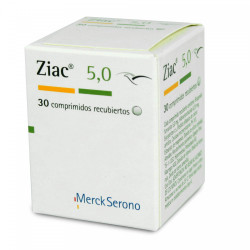Ziac (hydrochlorothiazide/bisoprolol) Coupons, Discounts & Cost
Ziac (hydrochlorothiazide/bisoprolol) is an antihypertensive drug. One way to save money on the Ziac retail cost regardless of income and insurance status is to use Ziac coupons or discount cards from RXCoupons. Use this Hydrochlorothiazide/Bisoprolol coupon at this online pharmacy and receive up to 75% off the sale price.
Ziac pharmachologic effect
Ziac is an antihypertensive drug. This drug includes two components: diuretic (hydrochlorothiazide) and beta-blocker (bisoprolol).
Bisoprolol is a beta-blocker that helps reduce blood pressure to normal levels.
Hydrochlorothiazide is a substance with a diuretic effect. Hydrochlorothiazide belongs to the group of thiazides. It has an antihypertensive effect.
Both active components are quickly absorbed in the digestive tract. Food does not affect the absorption of hydrochlorothiazide and bisoprolol. About 50% of the dose of bisoprolol is excreted by the kidneys. Hydrochlorothiazide is excreted through tubular secretion.
Ziac is used in the therapy of persons with arterial hypertension (when combined therapy with diuretics is required).
Medical information for Ziac dosage
Ziac tablets are taken regardless of food (preferably in the first half of the day). It is not recommended to chew the tablets before taking.
As for the beginning of therapy, it is recommended to take 1 tablet per day. If the effectiveness of the drug is not enough, then the patient can take 2 tablets per day.
Patients with impaired renal function do not need to change the dosage of Ziac.
As a rule, Ziac is used for long-term therapy.
It is necessary to stop the therapy with extreme caution in persons with ischemic heart disease.
Side effects of Ziac
Blood: thrombocytopenia, agranulocytosis, leukopenia.
Metabolism: loss of appetite, low levels of magnesium, potassium and sodium, metabolic alkalosis.
Nervous system: insomnia, depression, hallucinations, nightmares, hearing loss, headache, asthenia, dizziness.
Heart: orthostatic hypotension, bradycardia.
Respiratory system: bronchial spasm (mainly in patients with bronchial asthma or respiratory tract diseases);
Digestive system: pain in the epigastric region, vomiting, constipation, nausea, pancreatitis, jaundice, hepatitis.
Other side effects that may occur when taking Ziac: erectile dysfunction, myasthenia gravis, convulsions, chest pain, fatigue, hyperuricemia, hypertriglyceridemia.
Allergic reactions that may occur during treatment with Ziac: rhinitis, pruritus and rash, photodermatitis, urticaria, hyperemia, systemic lupus erythematosus, alopecia, psoriasis-like rash.
What are the contraindications for Ziac?
There are several contraindications for Ziac therapy: hypersensitivity to hydrochlorothiazide, bisoprolol, sulfonamides, severe form of bronchial asthma (as well as COPD), chronic heart failure, cardiogenic shock, sinoatrial block, atrioventricular block, bradycardia, Prinzmetal angina, arterial hypotension, pheochromocytoma, Raynaud's disease, violations of the liver and kidneys, combination therapy with sultopride, lithium and antiarrhythmic drugs.
Ziac is not used in pediatric patients.
Use with caution in patients with atrioventricular block (I degree), heart failure, psoriasis, thyrotoxicosis, gout, diabetes mellitus, depression, myasthenia gravis.
Thiazide diuretics should not be given to pregnant women.
Ziac special instructions
If there is a need to take other antihypertensive drugs, then it is necessary to start Ziac therapy with lower doses.
Combination therapy with sultopride and floctafenine should be avoided.
Do not mix this drug with lithium, amiodarone, as well as drugs that promote arrhythmia (including erythromycin, astemizole, halofantrine, sparfloxacin, terfenadine and pentamidine).
Ziac should be used with caution with lidocaine, baclofen, certain antiarrhythmic drugs (including quinidine, disopyramide, propafenone), diltiazem, bepridil and verapamil, urea preparations, anticholinesterase drugs, salicylates (in high doses), drugs that provoke hypokalemia (including amphotericin, mineralocorticoids, laxatives), cardiac glycosides, ACE inhibitors, potassium-sparing diuretic drugs, metformin.
Antipsychotics or tricyclic antidepressants can increase the antihypertensive effect of Ziac. This combination should be used with caution: it is necessary to adjust the dose of antihypertensive drugs to avoid excessive reduction of blood pressure.
There is an increased risk of hypercalcemia when combining Ziac with calcium preparations.
The drug should be administered with caution by patients with chronic heart failure. It is necessary to reduce the dose of the drug in the presence of clinical symptoms of bradycardia.
Elderly patients should start Ziac therapy with a low dose of the drug.
Patients should be warned about the risk of hypoglycemia (tachycardia, palpitation, excessive sweating).

